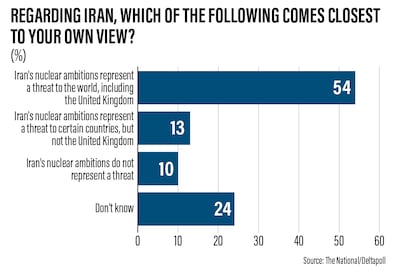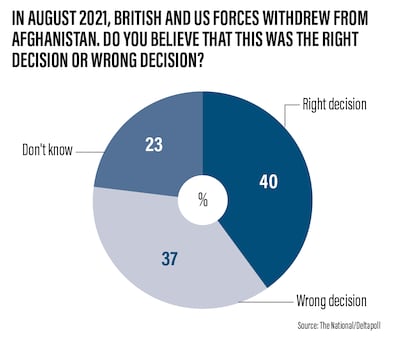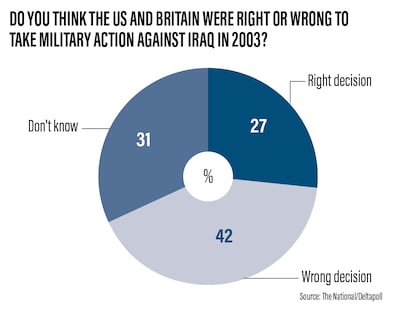At a time when there is mounting concern about Iran’s nuclear ambitions, the findings of a new poll show that a clear majority of the British people fully comprehend that Tehran potentially poses as much of a threat to their own welfare as it does the Middle East.
In the two decades or so since Iran’s nuclear programme first became an issue of global concern, there has been a tendency among some Western leaders to dismiss the threat Iran’s activities pose to their security. They argue it is a regional issue that requires a regional solution.
But while this argument may have had some merit when Iran’s missile capabilities were limited in range, the paradigm has changed significantly now that Iran has developed a new generation of long-range missiles. Western intelligence experts believe these are capable of carrying nuclear warheads. Suddenly, it is not Iran’s regional rivals in the Middle East that could be the targets of Iranian missiles, but European capitals, too.
Iran’s willingness, moreover, to use its missiles to attack European targets was made explicit in July. A news website affiliated with the Islamic Revolutionary Guard Corps (IRGC), the paramilitary organisation responsible for defending the Iranian regime, said it would be entirely justifiable for the organisation to attack opposition groups based in Europe with missiles and drones.
The escalating threat posed by Iran’s nuclear-related activities is clearly no longer confined to the Middle East region, as demonstrated by the findings of a new poll by The National.
By far the most revealing response was that 54 per cent of Britons now accept that Iran’s nuclear ambitions represent a threat to the entire world ― including the UK ― and is not only confined to the Middle East. By contrast, only 10 per cent believe that Iran’s nuclear ambitions do not represent a threat.
The acknowledgement that Iran’s nuclear ambitions can no longer be ignored by the wider international community would also explain the strong support expressed in the poll for Nato to expand its role across Europe.
Calls have been growing throughout Europe for Nato to increase its defensive capabilities following the outbreak of the Ukraine war earlier this year. This has essentially been a conflict between Russia and Ukraine over disputed territory in eastern and southern Ukraine.
The poll found that 46 per cent of respondents were in favour of Nato expanding its role across Europe following recent events in Ukraine, while only 5 per cent wanted it to reduce this.
Recent reports that Iran has been actively supporting Moscow by providing military equipment such as drones, as well as helping Russia to avoid the effects of Western sanctions, also mean that Tehran is closely involved in the conflict. It therefore poses just as much of a threat to Western security as Russia.
If the poll shows a growing awareness among the British public on the need to respond to the threat posed to European security by the likes of Iran and Russia, there are divisions over how the West has handled previous conflicts. These include the recent campaigns in Iraq and Afghanistan.
On Iraq, only 27 per cent of respondents thought the US and Britain were right to overthrow Saddam Hussein’s regime in 2003. Meanwhile, 40 per cent believed Britain and the US took the right decision to withdraw their forces from Afghanistan last summer.
There is one important conclusion that can be drawn from the report, therefore. While a significant percentage of the British public are in favour of taking robust measures to safeguard their security, they also expect their political leaders to give serious consideration to the consequences of their decisions before authorising military action.
Read more about the coronavirus
PROFILE
Name: Enhance Fitness
Year started: 2018
Based: UAE
Employees: 200
Amount raised: $3m
Investors: Global Ventures and angel investors
Labour dispute
The insured employee may still file an ILOE claim even if a labour dispute is ongoing post termination, but the insurer may suspend or reject payment, until the courts resolve the dispute, especially if the reason for termination is contested. The outcome of the labour court proceedings can directly affect eligibility.
- Abdullah Ishnaneh, Partner, BSA Law
Results:
Men's 100m T34: 1. Walid Ktila (TUN) 15 sec; 2. Rheed McCracken (AUS) 15.40; 3. Mohammed Al Hammadi (UAE) 15.75. Men's 400m T34: 1. Walid Ktila (TUN) 50.56; 2. Mohammed Al Hammadi (UAE) 50.94; 3. Henry Manni (FIN) 52.24.
Skoda Superb Specs
Engine: 2-litre TSI petrol
Power: 190hp
Torque: 320Nm
Price: From Dh147,000
Available: Now
Planes grounded by coronavirus
British Airways: Cancels all direct flights to and from mainland China
Hong Kong-based Cathay Pacific: Cutting capacity to/from mainland China by 50 per cent from Jan. 30
Chicago-based United Airlines: Reducing flights to Beijing, Shanghai, and Hong Kong
Ai Seoul: Suspended all flights to China
Finnair: Suspending flights to Nanjing and Beijing Daxing until the end of March
Indonesia's Lion Air: Suspending all flights to China from February
South Korea's Asiana Airlines, Jeju Air and Jin Air: Suspend all flights
UAE currency: the story behind the money in your pockets
Results:
Women:
1. Rhiannan Iffland (AUS) 322.95 points
2. Lysanne Richard (CAN) 285.75
3. Ellie Smart (USA) 277.70
Men:
1. Gary Hunt (GBR) 431.55
2. Constantin Popovici (ROU) 424.65
3. Oleksiy Prygorov (UKR) 392.30
THE SPECS
Jaguar F-Pace SVR
Engine: 5-litre supercharged V8
Transmission: 8-speed automatic
Power: 542bhp
Torque: 680Nm
Price: Dh465,071
The specs: 2018 Nissan Altima
Price, base / as tested: Dh78,000 / Dh97,650
Engine: 2.5-litre in-line four-cylinder
Power: 182hp @ 6,000rpm
Torque: 244Nm @ 4,000rpm
Transmission: Continuously variable tranmission
Fuel consumption, combined: 7.6L / 100km
The%20specs%20
%3Cp%3E%3Cstrong%3EEngine%3A%20%3C%2Fstrong%3E2.0-litre%204cyl%20turbo%0D%3Cbr%3E%3Cstrong%3EPower%3A%20%3C%2Fstrong%3E261hp%20at%205%2C500rpm%0D%3Cbr%3E%3Cstrong%3ETorque%3A%20%3C%2Fstrong%3E400Nm%20at%201%2C750-4%2C000rpm%0D%3Cbr%3E%3Cstrong%3ETransmission%3A%20%3C%2Fstrong%3E7-speed%20dual-clutch%20auto%0D%3Cbr%3E%3Cstrong%3EFuel%20consumption%3A%20%3C%2Fstrong%3E10.5L%2F100km%0D%3Cbr%3E%3Cstrong%3EOn%20sale%3A%20%3C%2Fstrong%3ENow%0D%3Cbr%3E%3Cstrong%3EPrice%3A%20%3C%2Fstrong%3EFrom%20Dh129%2C999%20(VX%20Luxury)%3B%20from%20Dh149%2C999%20(VX%20Black%20Gold)%3C%2Fp%3E%0A
Roll of honour: Who won what in 2018/19?
West Asia Premiership: Winners – Bahrain; Runners-up – Dubai Exiles
UAE Premiership: Winners – Abu Dhabi Harlequins; Runners-up – Jebel Ali Dragons
Dubai Rugby Sevens: Winners – Dubai Hurricanes; Runners-up – Abu Dhabi Harlequins
UAE Conference: Winners – Dubai Tigers; Runners-up – Al Ain Amblers
'Midnights'
%3Cp%3E%3Cstrong%3EArtist%3A%3C%2Fstrong%3E%20Taylor%20Swift%26nbsp%3B%3C%2Fp%3E%0A%3Cp%3E%3Cstrong%3ELabel%3A%3C%2Fstrong%3E%20Republic%20Records%3C%2Fp%3E%0A%3Cp%3E%3Cstrong%3ERating%3A%3C%2Fstrong%3E%204%2F5%3C%2Fp%3E%0A
Infiniti QX80 specs
Engine: twin-turbocharged 3.5-liter V6
Power: 450hp
Torque: 700Nm
Price: From Dh450,000, Autograph model from Dh510,000
Available: Now
More from Rashmee Roshan Lall
A cheaper choice
Vanuatu: $130,000
Why on earth pick Vanuatu? Easy. The South Pacific country has no income tax, wealth tax, capital gains or inheritance tax. And in 2015, when it was hit by Cyclone Pam, it signed an agreement with the EU that gave it some serious passport power.
Cost: A minimum investment of $130,000 for a family of up to four, plus $25,000 in fees.
Criteria: Applicants must have a minimum net worth of $250,000. The process take six to eight weeks, after which the investor must travel to Vanuatu or Hong Kong to take the oath of allegiance. Citizenship and passport are normally provided on the same day.
Benefits: No tax, no restrictions on dual citizenship, no requirement to visit or reside to retain a passport. Visa-free access to 129 countries.
Our legal consultant
Name: Hassan Mohsen Elhais
Position: legal consultant with Al Rowaad Advocates and Legal Consultants.
The specs
BMW M8 Competition Coupe
Engine 4.4-litre twin-turbo V8
Power 625hp at 6,000rpm
Torque 750Nm from 1,800-5,800rpm
Gearbox Eight-speed paddleshift auto
Acceleration 0-100kph in 3.2 sec
Top speed 305kph
Fuel economy, combined 10.6L / 100km
Price from Dh700,000 (estimate)
On sale Jan/Feb 2020
Our legal consultant
Name: Hassan Mohsen Elhais
Position: legal consultant with Al Rowaad Advocates and Legal Consultants.
Global Fungi Facts
• Scientists estimate there could be as many as 3 million fungal species globally
• Only about 160,000 have been officially described leaving around 90% undiscovered
• Fungi account for roughly 90% of Earth's unknown biodiversity
• Forest fungi help tackle climate change, absorbing up to 36% of global fossil fuel emissions annually and storing around 5 billion tonnes of carbon in the planet's topsoil
Who was Alfred Nobel?
The Nobel Prize was created by wealthy Swedish chemist and entrepreneur Alfred Nobel.
- In his will he dictated that the bulk of his estate should be used to fund "prizes to those who, during the preceding year, have conferred the greatest benefit to humankind".
- Nobel is best known as the inventor of dynamite, but also wrote poetry and drama and could speak Russian, French, English and German by the age of 17. The five original prize categories reflect the interests closest to his heart.
- Nobel died in 1896 but it took until 1901, following a legal battle over his will, before the first prizes were awarded.
RESULTS
5pm Maiden (PA) Dh80,000 (Turf) 1,600m
Winner Thabet Al Reef, Bernardo Pinheiro (jockey), Abdallah Al Hammadi (trainer)
5.30pm Handicap (PA) Dh80,000 (T) 1,600m
Winner Blue Diamond, Pat Cosgrave, Abdallah Al Hammadi
6pm Arabian Triple Crown Round-1 Listed (PA) Dh230,000 (T) 1,600m
Winner Hameem, Adrie de Vries, Abdallah Al Hammadi
6.30pm Wathba Stallions Cup Handicap (PA) Dh70,000 (T) 1,400m
Winner Shoja’A Muscat, Szczepan Mazur, Ibrahim Al Hadhrami
7pm Maiden (PA) Dh80,000 (T) 1,200m
Winner Heros De Lagarde, Szczepan Mazur, Ibrahim Al Hadhrami
7.30pm Handicap (TB) Dh100,000 (T) 2,400m
Winner Good Tidings, Antonio Fresu, Musabah Al Muhairi
THE BIO
Family: I have three siblings, one older brother (age 25) and two younger sisters, 20 and 13
Favourite book: Asking for my favourite book has to be one of the hardest questions. However a current favourite would be Sidewalk by Mitchell Duneier
Favourite place to travel to: Any walkable city. I also love nature and wildlife
What do you love eating or cooking: I’m constantly in the kitchen. Ever since I changed the way I eat I enjoy choosing and creating what goes into my body. However, nothing can top home cooked food from my parents.
Favorite place to go in the UAE: A quiet beach.
HWJN
%3Cp%3EDirector%3A%20Yasir%20Alyasiri%3C%2Fp%3E%0A%3Cp%3EStarring%3A%20Baraa%20Alem%2C%20Nour%20Alkhadra%2C%20Alanoud%20Saud%3C%2Fp%3E%0A%3Cp%3ERating%3A%203%2F5%3C%2Fp%3E%0A%3Cp%3E%3C%2Fp%3E%0A
The specs
Engine: 2.0-litre 4-cyl, 48V hybrid
Transmission: eight-speed automatic
Power: 325bhp
Torque: 450Nm
Price: Dh289,000
The specs: 2019 Haval H6
Price, base: Dh69,900
Engine: 2.0-litre turbocharged four-cylinder
Transmission: Seven-speed automatic
Power: 197hp @ 5,500rpm
Torque: 315Nm @ 2,000rpm
Fuel economy, combined: 7.0L / 100km
MATCH INFO
Uefa Champions League, last 16, first leg
Ajax v Real Madrid, midnight (Thursday), BeIN Sports
Getting there
The flights
Emirates and Etihad fly to Johannesburg or Cape Town daily. Flights cost from about Dh3,325, with a flying time of 8hours and 15 minutes. From there, fly South African Airlines or Air Namibia to Namibia’s Windhoek Hosea Kutako International Airport, for about Dh850. Flying time is 2 hours.
The stay
Wilderness Little Kulala offers stays from £460 (Dh2,135) per person, per night. It is one of seven Wilderness Safari lodges in Namibia; www.wilderness-safaris.com.
Skeleton Coast Safaris’ four-day adventure involves joining a very small group in a private plane, flying to some of the remotest areas in the world, with each night spent at a different camp. It costs from US$8,335.30 (Dh30,611); www.skeletoncoastsafaris.com





